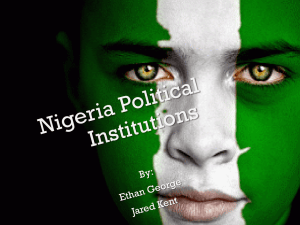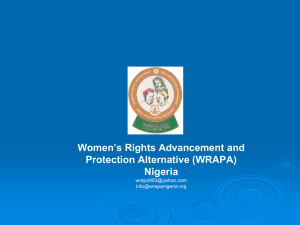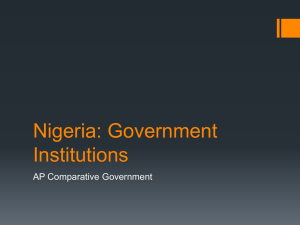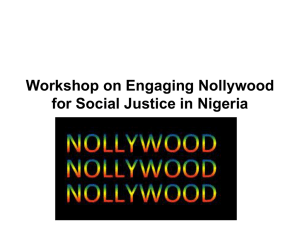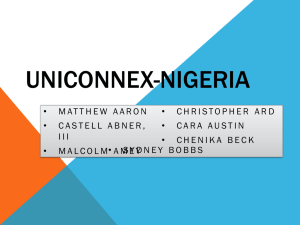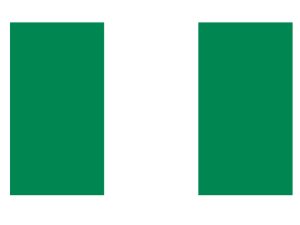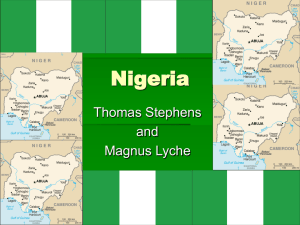Nigeria Political and Economic Changes
advertisement
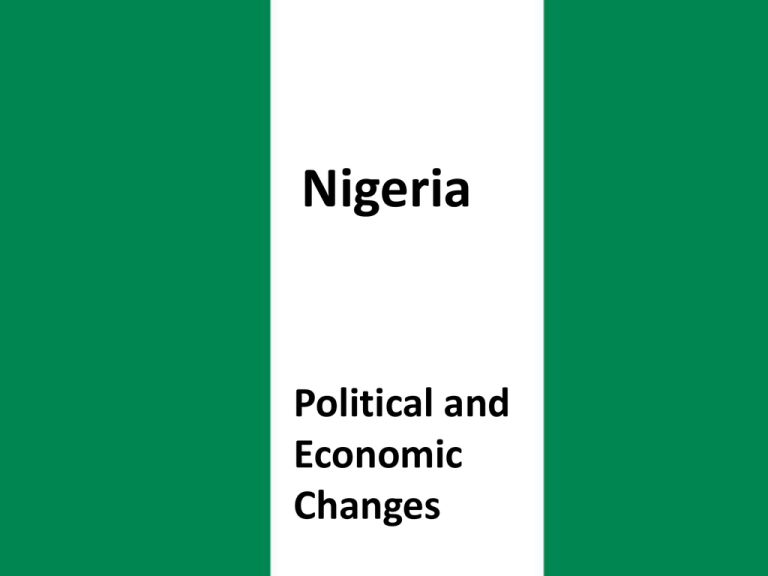
Nigeria Political and Economic Changes Presentation Outline IV. Political and Economic Changes a) Politics in Nigeria before 1999 b) Democratization after 1999 c) Rentier state d) Para-statals e) Attempts at economic liberalization IV. a) Nigerian politics before 1999 • From independence in 1960 until 1999 Nigeria had several military coups, some brief interludes of democracy, and generally corrupt and authoritarian rule • The most notorious of Nigeria’s military dictators was General Sani Abacha who ruled Nigeria from 1993-1998 General Sani Abacha Nigeria under Abacha’s dictatorship, 1993-98 • Nigeria was ranked as one of the world’s most corrupt states • Abacha was accused of stealing 5 billion dollars from the Nigerian treasury • There were widespread human rights abuses including the arbitrary arrest, imprisonment, and execution of several journalists and high profile human rights activist Abacha ranks as one of the most corrupt leaders in modern history In 1998 Nigeria was considered the 4th most corrupt state in the whole world! Ken Saro Wiwa was a member of the Ogoni tribe who protested the environmental damage and corruption caused by the MNC Shell Oil corporation in the Niger Delta. On Abachi’s orders he was tried and executed in 1995. This one of Nigeria’s most blatant human rights abuses. Saro-Wiwa’s execution was widely condemned by the international community. IV. b) Democratization after 1999 • After Abachi’s death in 1998 the military decided to hand over rule to a democratically elected civilian leadership • A new, democratic constitution was created which established a presidential, U.S. style republican democracy Attempts at institutionalizing democracy • In 1998 the Independent National Election Commission (INEC) was established to ensure and oversee competitive, free, and fair elections • Although a multi-party system did evolve in 1999, the most international observers have characterized Nigerian elections as fraudulent and corrupt. • Even INEC itself has been accused of rigging elections in favor of the ruling PDP Party • Nigeria’s Supreme Court has the power of judicial review • In 2007, the Court successfully removed two state governors who sought to stay in power and also blocked President Obasanjo’s attempt to seek a third term • In 2003 the Economic and Financial Crimes Commission (EFCC) was established to reduce corruption and punish fraud • Despite several high profile arrests in 2007, the EFCC’s budget has been cut and it is uncertain whether it will be allowed to operate freely and independently in the future Improving press freedoms and a reduction of corruption • Nigeria’s press is characterized as partly free and, although corruption remains a serious problem in Nigeria, it has improved since 1999 • The press has been generally free to report, investigate, and cover national elections Nigeria’s press is considered partly free. Not nearly as restricted as several states in Africa. However, Nigeria’s press is hardly a model of democracy even by African standards Russia U.K. Mexico China Iran Nigeria Nigeria is certainly corrupt but fairs better than several states in Africa and Asia IV. c) Rentier state • Like Iran, Nigeria is a rentier state whose economy is dependent on oil revenues • Over 80% of Nigeria’s exports are from oil sales • When the price of oil is high, Nigeria’s economy remains stable • However, when oil prices decline, Nigeria’s economy can potentially fall into chaos with huge unemployment and hyperinflation Nigeria’s economy is nearly completely dependent on oil production. Oil has been both a blessing and a curse for Nigeria Oil: a blessing and a curse Blessing • Huge source of revenues • Oil revenues have been used to build roads, schools, and hospitals • As a member of OPEC Nigeria has international influence Curse • Has led to violent clashes in the Niger Delta region • Has polluted Nigeria’s natural environment • Oil wealth has been squandered by corruption • Nigeria has failed to diversify its economy IV. d) Para-statals • Para-statals are government run corporations • In Iran, they are called bonyads • Para-statals are generally run inefficiently, a major channels of corruption, and represent obstacles to full economic liberalization • Nigeria’s Power Holding electricity company has been infamous for its high prices and large scale power outages Some of Nigeria’s major para-statals Nigerian Postal Service Nigerian Sugar Company Nigerian Petroleum Power Holding Company of Nigeria Nigerian National Insurance Commission IV. e) Attempts at economic liberalization • Beginning in 1985 Nigeria sought assistance from the International Monetary Fund (IMF) to manage and restructure its debt • Nigeria’s economy had been suffering due to rapidly falling oil prices in the 1980s • The IMF agreed to help Nigeria on the condition that Nigeria accept structural adjustment (SAP) Structural Adjustment • Under the terms of the IMF SAP, Nigeria had to agree to the following: 1) Allow foreign direct investment (FDI) 2) Balance its national budget 3) Take steps to reduce corruption 4) Privatize key sectors of its economy 5) Promote the rule of law Results • Nigeria has fulfilled its pledge to increase FDI • Corruption has been addressed but remains a major problem • The rule of law has been made a government priority but remains a problem • As soon as oil prices started to climb in the early 2000s Nigeria fell back on its promises to fully privatize its economy and still has major debt, though it is in a much better situation economically than it was in the 1980s and 1990s and is the fastest growing economy in Africa Since 1999 Nigeria’s GDP growth has been higher than the Middle East and African average Of the BRIC countries, only China’s economy has grown more than Nigeria’s since 1999! Huge growth in FDI since 2002!


